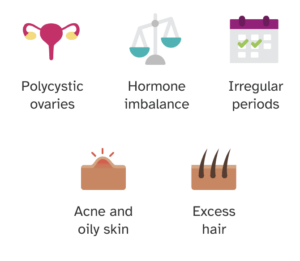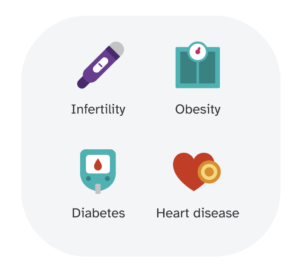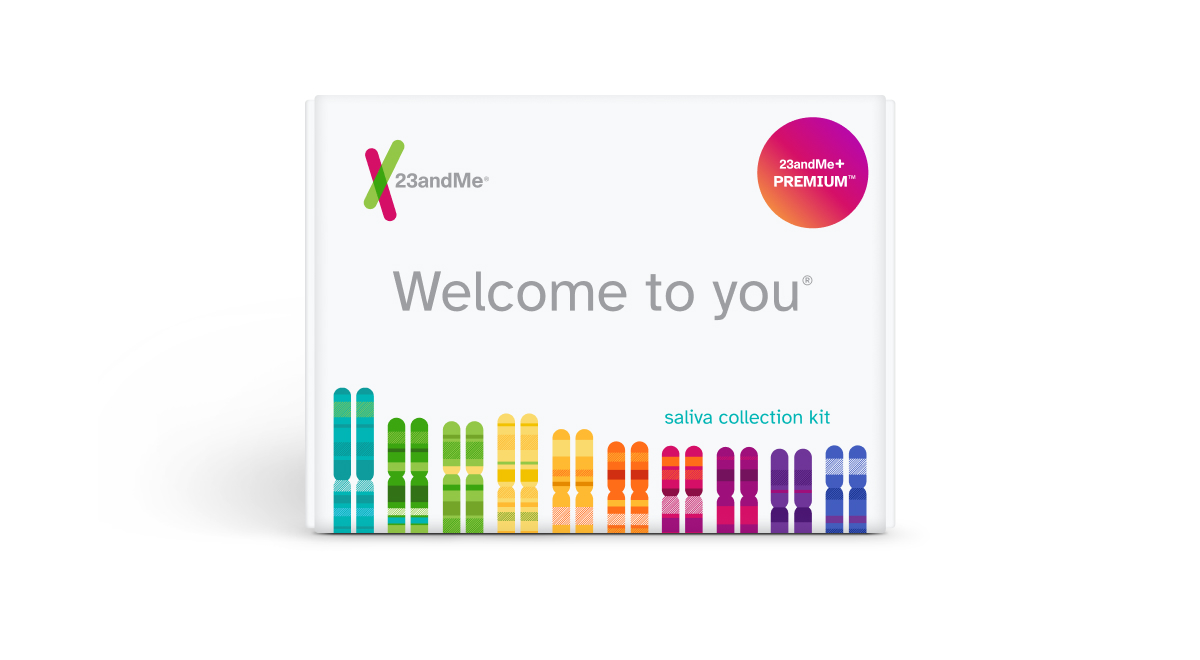Is PCOS Genetic?Explore PCOS and what your DNA can tell you
Medically reviewed by:
What is polycystic ovary syndrome?
Polycystic ovary syndrome (PCOS) is a hormone disorder that affects people who have ovaries. People with PCOS may have high testosterone levels, irregular periods, and/or more ovarian follicles than usual (polycystic ovaries). Other common symptoms include irregular periods, weight gain, acne, oily skin, and excess hair growth on the face, chest, or other parts of the body.

How can PCOS impact your health?
PCOS can increase the risk for infertility and pregnancy-related complications. This condition is also associated with many different health conditions including obesity, diabetes, heart disease, fatty liver disease, and endometrial cancer. Some people with PCOS also experience sleep apnea, anxiety, and depression.
For people with PCOS, it’s important to talk with a healthcare professional about the risk for these conditions in addition to reproductive concerns. Although there is no cure for PCOS, treatment plans — including medications and lifestyle modifications — can help manage the condition.

Is PCOS genetic?
Genetics do play a role in PCOS. This means some people may be more likely to have PCOS than others, depending on their genetics. PCOS can run in families, which means that a person has an increased chance of having PCOS if family members have the condition. In most cases, it is a combination of many different genetic variants that impact a person’s chances of having PCOS. Individually, each of these variants only has a small impact on a person’s genetic likelihood, but that impact can grow when many variants are considered together. 23andMe takes into account more than 1,300 genetic markers to estimate the likelihood of having PCOS.
Find Out if Your Genetics Might Increase Your Likelihood for Developing PCOS.
How common is PCOS?
PCOS is one of the most common causes of female infertility. It affects about 10% of females and is more common in those with a family history of the condition. Hormonal birth control can mask many of the symptoms, so some people with PCOS are not diagnosed until they stop taking birth control and have trouble getting pregnant.

Find out if your genetics might increase your likelihood of developing PCOS
Curious whether you have an increased likelihood of having PCOS based on your genetics? Find out more with the Polycystic Ovary Syndrome report (Powered by 23andMe Research), part of the 23andMe+ Premium membership. 23andMe+ Premium includes our Health + Ancestry Service plus new premium reports and features throughout the year.

23andMe+ Premium
Please note:
- Because PCOS can only impact people who have ovaries, the report is only available to 23andMe+ members who report their birth sex as female in their Account Settings.
- This report does not diagnose PCOS and should not be used to make medical decisions.
- The report was developed by 23andMe scientists using data and insights gathered from thousands of customers who consent to participate in our research. Reports based on 23andMe research provide an estimate of your likelihood of developing a condition based on your genetics and other factors. This report does not account for lifestyle or family history.
- The report does not account for every possible genetic variant that could affect your likelihood of having PCOS.
References:
- Azziz R et al. (2016). “Polycystic ovary syndrome.” Nat Rev Dis Primers. 2:16057.
- Barber TM et al. (2006). “Obesity and polycystic ovary syndrome.” Clin Endocrinol (Oxf). 65(2):137-45.
- Barber TM et al. (2019). “Obesity and Polycystic Ovary Syndrome: Implications for Pathogenesis and Novel Management Strategies.” Clin Med Insights Reprod Health. 13:1179558119874042.
- Dumesic DA et al. (2013). “Cancer risk and PCOS.” Steroids. 78(8):782-5.
- El Hayek S et al. (2016). “Poly Cystic Ovarian Syndrome: An Updated Overview.” Front Physiol. 7:124.
- Gambineri A et al. (2012). “Polycystic ovary syndrome is a risk factor for type 2 diabetes: results from a long-term prospective study.” Diabetes. 61(9):2369-74.
- Goyal M et al. (2017). “Debates Regarding Lean Patients with Polycystic Ovary Syndrome: A Narrative Review.” J Hum Reprod Sci. 10(3):154-161.
- Harris HR et al. (2016). “Polycystic ovary syndrome and risk of endometrial, ovarian, and breast cancer: a systematic review.” Fertil Res Pract. 2:14.
- Hart R et al. (2015). “The potential implications of a PCOS diagnosis on a woman’s long-term health using data linkage.” J Clin Endocrinol Metab. 100(3):911-9.
- Hull MG. (1987). “Epidemiology of infertility and polycystic ovarian disease: endocrinological and demographic studies.” Gynecol Endocrinol. 1(3):235-45.
- Mayo Clinic. “Polycystic ovary syndrome.” Retrieved December 6, 2020, from https://www.mayoclinic.org/diseases-conditions/pcos/symptoms-causes/syc-20353439.
- MedlinePlus. “Polycystic ovary syndrome.” Retrieved December 6, 2020, from https://medlineplus.gov/genetics/condition/polycystic-ovary-syndrome/.
- National Institute of Child Health and Human Development. “Polycystic Ovary Syndrome (PCOS).” Retrieved December 6, 2020, from https://www.nichd.nih.gov/health/topics/pcos.
- Stener-Victorin E et al. (2019). “Origins and Impact of Psychological Traits in Polycystic Ovary Syndrome.” Med Sci (Basel). 7(8).
- Teede H et al. (2010). “Polycystic ovary syndrome: a complex condition with psychological, reproductive and metabolic manifestations that impacts on health across the lifespan.” BMC Med. 8:41.
- Teede HJ et al. (2018). “Recommendations from the international evidence-based guideline for the assessment and management of polycystic ovary syndrome.” Fertil Steril. 110(3):364-379.
- Wild RA et al. (2010). “Assessment of cardiovascular risk and prevention of cardiovascular disease in women with the polycystic ovary syndrome: a consensus statement by the Androgen Excess and Polycystic Ovary Syndrome (AE-PCOS) Society.” J Clin Endocrinol Metab. 95(5):2038-49.
- Yu HF et al. (2016). “Association between polycystic ovary syndrome and the risk of pregnancy complications: A PRISMA-compliant systematic review and meta-analysis.” Medicine (Baltimore). 95(51):e4863.